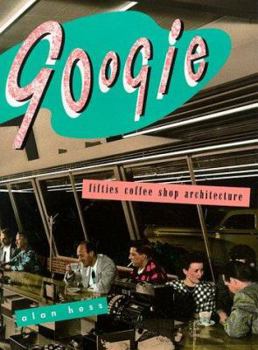Googie: Fifties Coffee Shop Architecture
The euphoria about the future that followed World War II permeated the outlooks of architects, who, influenced by Frank Lloyd Wright and with ready access to remarkable new construction material and building techniques spawned by the war technologies, faced the intriguing prospect of redesigning the post war world. Initially the futuristic designs were outrageous, and detractors labeled these structures the Googie School of Architecture after a particularly...
Format:Paperback
Language:English
ISBN:0877013349
ISBN13:9780877013341
Release Date:January 1986
Publisher:Chronicle Books (CA)
Length:144 Pages
Weight:1.12 lbs.
Dimensions:0.7" x 7.5" x 10.0"
Customer Reviews
2 ratings
The best essay ever written on 'my' era..
Published by Thriftbooks.com User , 22 years ago
This book, quite simply, changed my life. After picking this little gem up off a bargain rack in an Albuquerque book store in 1987, I soon found myself enraptured with the imagery I had all but forgotten growing up in the late 50s and early 60s. Not a me-too bandwagon chaser of retro themes, I have since become quite a collector of my era's decor, automobiles and publications... even started my own small castings/sculptural studio that has produced and sold a number of designs that have been well-received by the collectors who know my work.I moved to Los Angeles in 1989, largely motivated by what I read in this book, and my obsession in finding the remaining treasures Hess listed. I was ecstatic to find my then-new digs 2 blocks away from the hallowed glass walls of Chips Coffee Shop in Hawthorne, CA! And thankfully it is still intact as of this writing (June 2002). May Googie live forever! And now, the search is on for another copy of the book, as I lost mine years ago. Nothing could please me more than to have the new copy signed by the author himself.
Formica in Context
Published by Thriftbooks.com User , 25 years ago
Alan Hess has produced a significant analysis of 50s architecture and design. The title suggests that Hess' focus lies in coffee shop architecture; however, the book is in fact much more diverse. Social trends in post-war Los Angeles, such as automobile and housing design, do much to provide context for Hess' assertions and observations. This is the true value of Hess' work. He does not provide a simple nostalgic or anecdotal look at the overly-regurgitated 50s; rather, he seeks to provide a thoughtful analysis of an indigenous American architectural style. Ultimately, Hess seeks to defend a style that remains either maligned by proponents of "higher" architechtural forms, or reduced to simple nostalgia and trivialization. Hess succeeds admirably in this pursuit. This book is recommended for all who require a more thoughtful and contextual analysis of American popular culture, history, and design.





